Related Research Articles

The Dixie Cups are an American pop music girl group established in the 1960s. They are best known for a string of hits including their singles "Chapel of Love", "People Say", and "Iko Iko".
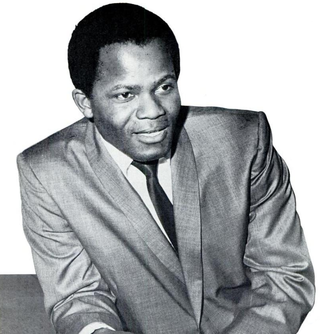
Yusuf Hazziez, known professionally as Joe Tex, was an American singer and musician who gained success in the 1960s and 1970s with his brand of Southern soul, which mixed the styles of funk, country, gospel, and rhythm and blues.

Toby Keith Covel was an American country music singer, songwriter, record producer, actor, and businessman.

"Ain't Too Proud to Beg" is a 1966 song and hit single by the Temptations for Motown Records' Gordy label, produced by Norman Whitfield and written by Whitfield and Edward Holland Jr. The song peaked at number 13 on the Billboard Pop Chart, and was a number-one hit on the Billboard R&B charts for eight non-consecutive weeks. The song's success, in the wake of the relative underperformance of the previous Temptations' single, "Get Ready", resulted in Norman Whitfield replacing Smokey Robinson, producer of "Get Ready", as the Temptations' main producer. In 2004 it finished number 94 in AFI's 100 Years...100 Songs poll thanks to its inclusion in The Big Chill soundtrack.
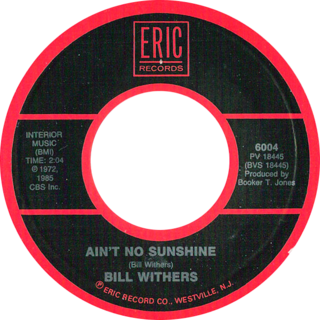
"Ain't No Sunshine" is a song by Bill Withers, from his 1971 debut album Just As I Am, produced by Booker T. Jones. The record featured musicians Donald "Duck" Dunn on bass guitar, Al Jackson Jr. on drums and Stephen Stills on guitar. String arrangements were done by Booker T. Jones. The song was recorded in Los Angeles, with overdubs in Memphis by engineer Terry Manning.
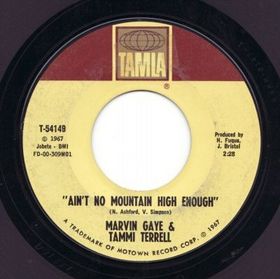
"Ain't No Mountain High Enough" is a song written by Nickolas Ashford & Valerie Simpson in 1966 for the Tamla label, a division of Motown. The composition was first successful as a 1967 hit single recorded by Marvin Gaye and Tammi Terrell, and became a hit again in 1970 when recorded by former Supremes frontwoman Diana Ross. The song became Ross's first solo number-one hit on the Billboard Hot 100 chart and was nominated for the Grammy Award for Best Female Pop Vocal Performance.

Eric Howard Carmen was an American singer-songwriter and multi-instrumentalist. He was the lead vocalist of the Raspberries, with whom he recorded the hit "Go All the Way" and four albums. He embarked on a solo career in 1975 and had global success with "All by Myself", "Never Gonna Fall in Love Again", "She Did It", "Hungry Eyes", and "Make Me Lose Control". In later years, he toured with Ringo Starr & His All-Starr Band before reforming the Raspberries in 2004.
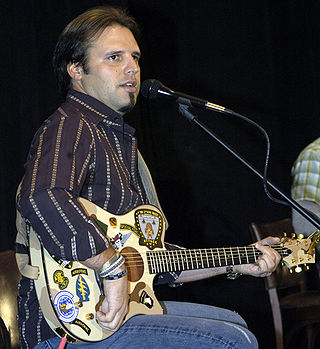
Mark Wills is an American country music artist. Signed to Mercury Records between 1996 and 2003, he released five studio albums for the label – Mark Wills, Wish You Were Here, Permanently, Loving Every Minute, and And the Crowd Goes Wild – as well as a greatest hits package. In that same timespan, he charted sixteen singles on the Billboard country charts, all of which made the top 40. After leaving Mercury in 2003, he signed to Equity Music Group and charted three more singles. Two of these were later included on his sixth studio album, Familiar Stranger, which was released on the Tenacity label in 2008.

The Walker Brothers were an American pop group formed in Los Angeles in 1964 by John Walker and Scott Walker, with Gary Walker joining shortly after. They adopted the 'Walker Brothers' name as a show business touch even though none of the members were related. After moving to Britain in 1965, they had several Top 10 albums and singles there, including the No. 1 hits "Make It Easy on Yourself" and "The Sun Ain't Gonna Shine (Anymore)", both of which also made the US Top 20 and Canadian Top 2. Between them was the UK No. 3 hit "My Ship is Coming In". They provided a unique counterpoint to the British Invasion by achieving much more success in the UK than in their home country, a period when the popularity of British bands such as The Beatles dominated the U.S. charts.

"You Ain't Seen Nothing Yet" is a song by Canadian rock band Bachman–Turner Overdrive (BTO). The song was written by Randy Bachman for the band's third studio album Not Fragile (1974). It was released as a single in 1974, with an instrumental track "Free Wheelin'" as the B-side. It reached the number one position on the Billboard Hot 100 singles chart and the Canadian RPM chart the week of November 9, 1974, as well as earning the band their only major hit single in the United Kingdom, peaking at number 2 on the UK Singles Chart. The follow-up single, "Roll on Down the Highway", was also a minor UK hit.

Marvin Earl Johnson was an American R&B singer, songwriter and pianist. He was influential in the development of the Motown style of music, primarily for the song "Come to Me," which was the first record issued by Tamla Records, the precursor to the famous label.
"The Sun Ain't Gonna Shine (Anymore)" is a song written by Bob Crewe and Bob Gaudio.

Trace Adkins is an American country music singer. His discography consists of fourteen studio albums and six greatest hits albums. Of his fourteen studio albums, six have been certified by the RIAA: 1997's Big Time is certified Gold, as are 2001's Chrome, and 2006's Dangerous Man. His 1996 debut Dreamin' Out Loud and 2003's Comin' On Strong are certified Platinum. 2005's Songs About Me is his best-selling album, certified 2× Platinum by the RIAA. Two of Adkins' compilation albums, Greatest Hits Collection, Vol. 1 and American Man: Greatest Hits Volume II are certified Platinum

"I Ain't Gonna Stand for It" is the second single from Stevie Wonder's 1980 album, Hotter Than July. It reached number four on the Billboard R&B singles chart and number 11 on the Hot 100. It also hit number 10 on the UK Singles Chart. The song is famous for Wonder's imitation of a seasoned country-and-western crooner and his inspiring drumming. Charlie and Ronnie Wilson of The Gap Band provide backing vocals on the song. It was covered by Eric Clapton in 2001.
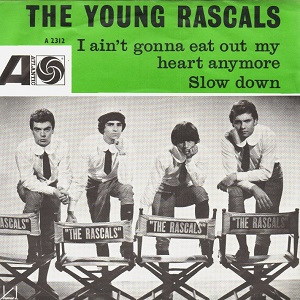
"I Ain't Gonna Eat Out My Heart Anymore" is a song written by Pam Sawyer and Laurie Burton in 1965. Originally envisioned to be recorded by a British Invasion artist, the song was extremely well liked by the American rock group the Young Rascals, and they subsequently recorded the song and released it as their debut single in November 1965 through Atlantic Records. Though only a marginal hit, reaching number 52 on the Billboard Hot 100, it largely established the band on the American music scene. It has since been included on several albums by the band, including their eponymous debut album, and several compilation albums, including Time Peace: The Rascals' Greatest Hits, on which it was the opening track.

The singles discography of American country music singer Reba McEntire contains 126 singles. They are further categorized by 100 released as a lead artist, seven as a featured artist and 19 that were issued as promotional singles. In addition to singles, eight unofficial singles were released and made charting positions in both the United States and Canada. After being discovered by Red Steagall, McEntire signed a recording contract with Polygram/Mercury Records in 1975. In 1977, she released her debut, self-titled album, which yielded four singles that low-charting entries on the Billboard Hot Country Songs survey. She had her first major hit as a solo artist with a remake of Patsy Cline's "Sweet Dreams" (1979).
"Ain't Gonna Bump No More (With No Big Fat Woman)" is a song composed by Joe Tex and Buddy Killen, and released by Tex as a single in December 1976, bringing the musician back to the top 40 of the US pop and R&B charts simultaneously for the first time since 1972's "I Gotcha". Tex used his aunt Bennie Lee McGinty's name as composer for tax reasons.

"98.6" is a song written by Tony Powers (lyrics) and George Fischoff (music) and recorded by Keith. It reached No. 6 in Canada, No. 7 on the Billboard chart, and No. 24 on the UK Singles Chart in 1967 and appeared on his 1967 album 98.6/Ain't Gonna Lie. The Tokens, who had provided the backing vocals on Keith's debut single, "Ain't Gonna Lie", did the same for "98.6".

Anthology is a compilation album by country pop singer Juice Newton. It was originally released by Renaissance Records on October 13, 1998. The album covers her career from 1975 to 1989 and features 19 songs taken from her albums Juice Newton & Silver Spur, Juice, Quiet Lies, Can't Wait All Night, Old Flame, Emotion, and Ain't Gonna Cry. However, it includes the 1975 take of "The Sweetest Thing " from the first RCA album, not the 1981 hit version from Juice.

"There Ain't No Future in This" is a song written by Bill Rice and Sharon Vaughn, and recorded by American country music artist Reba McEntire. It was released in November 1983 as the second single from the album Behind the Scene. The song became a top 20 hit on the American country chart.
References
- 1 2 3 4 5 6 Jason Ankeny (May 7, 1949). "Keith | Biography". AllMusic. Retrieved January 26, 2014.
- ↑ "Bazza Keefer – Biography". IMDB.com. Retrieved January 26, 2014.
- 1 2 "The official Keith website! About Keith – Biography!". Keith986.com. May 17, 1949. Retrieved January 26, 2014.
- ↑ Roberts, David (2006). British Hit Singles & Albums (19th ed.). London: Guinness World Records Limited. p. 297. ISBN 1-904994-10-5.
- ↑ "Official [U.K.] Singles Chart Top 50: 16–22 February 1967". Officialcharts.com. Retrieved May 29, 2018.
- 1 2 Murrells, Joseph (1978). The Book of Golden Discs (2nd ed.). London: Barrie and Jenkins Ltd. p. 207. ISBN 0-214-20512-6.
- ↑ Archived May 27, 2005, at the Wayback Machine
- 1 2 "The Official Keith Site-Media: Where Are They Now..from Rolling Stone Magazine". Keith986.com. Retrieved January 26, 2014.